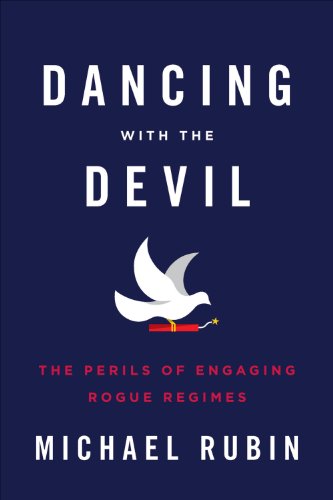Verwandte Artikel zu Dancing with the Devil: The Perils of Engaging Rogue...

Inhaltsangabe
The world has seldom been as dangerous as it is now. Rogue regimes--governments and groups that eschew diplomatic normality, sponsor terrorism, and proliferate nuclear weapons--threaten the United States around the globe. Because sanctions and military action are so costly, the American strategy of first resort is dialogue, on the theory that "it never hurts to talk to enemies." Seldom is conventional wisdom so wrong. Engagement with rogue regimes is not cost-free, as Michael Rubin demonstrates by tracing the history of American diplomacy with North Korea, Iran, Iraq, Libya, the Taliban's Afghanistan, and Pakistan. Further challenges to traditional diplomacy have come from terrorist groups, such as the PLO in the 1970s and 1980s, or Hamas and Hezbollah in the last two decades. The argument in favor of negotiation with terrorists is suffused with moral equivalence, the idea that one man's terrorist is another man's freedom fighter. Rarely does the actual record of talking to terrorists come under serious examination. While soldiers spend weeks developing lessons learned after every exercise, diplomats generally do not reflect on why their strategy toward rogues has failed, or consider whether their basic assumptions have been faulty. Rubin's analysis finds that rogue regimes all have one thing in common: they pretend to be aggrieved in order to put Western diplomats on the defensive. Whether in Pyongyang, Tehran, or Islamabad, rogue leaders understand that the West rewards bluster with incentives and that the U.S. State Department too often values process more than results.
Die Inhaltsangabe kann sich auf eine andere Ausgabe dieses Titels beziehen.
Über die Autorin bzw. den Autor
Michael Rubin, a former Pentagon official, is a resident scholar at the American Enterprise Institute and a senior lecturer at the Naval Postgraduate School.
„Über diesen Titel“ kann sich auf eine andere Ausgabe dieses Titels beziehen.
EUR 9,77 für den Versand von USA nach Deutschland
Versandziele, Kosten & DauerNeu kaufen
Diesen Artikel anzeigenEUR 1,87 für den Versand von USA nach Deutschland
Versandziele, Kosten & DauerSuchergebnisse für Dancing with the Devil: The Perils of Engaging Rogue...
Dancing with the Devil : The Perils of Engaging Rogue Regimes
Anbieter: Better World Books, Mishawaka, IN, USA
Zustand: Very Good. First American Edition. Former library book; may include library markings. Used book that is in excellent condition. May show signs of wear or have minor defects. Artikel-Nr. 8010545-6
Anzahl: 1 verfügbar
Dancing with the Devil: The Perils of Engaging Rogue Regimes
Anbieter: ThriftBooks-Atlanta, AUSTELL, GA, USA
Hardcover. Zustand: Good. No Jacket. Pages can have notes/highlighting. Spine may show signs of wear. ~ ThriftBooks: Read More, Spend Less 1.8. Artikel-Nr. G159403723XI3N00
Anzahl: 1 verfügbar
Dancing with the Devil: The Perils of Engaging Rogue Regimes
Anbieter: ThriftBooks-Atlanta, AUSTELL, GA, USA
Hardcover. Zustand: Very Good. No Jacket. Former library book; May have limited writing in cover pages. Pages are unmarked. ~ ThriftBooks: Read More, Spend Less 1.8. Artikel-Nr. G159403723XI4N10
Anzahl: 1 verfügbar
Dancing with the Devil: The Perils of Engaging Rogue Regimes
Anbieter: ThriftBooks-Dallas, Dallas, TX, USA
Hardcover. Zustand: Very Good. No Jacket. Former library book; May have limited writing in cover pages. Pages are unmarked. ~ ThriftBooks: Read More, Spend Less 1.8. Artikel-Nr. G159403723XI4N10
Anzahl: 1 verfügbar
Dancing with the Devil: The Perils of Engaging Rogue Regimes
Anbieter: ThriftBooks-Dallas, Dallas, TX, USA
Hardcover. Zustand: Good. No Jacket. Pages can have notes/highlighting. Spine may show signs of wear. ~ ThriftBooks: Read More, Spend Less 1.8. Artikel-Nr. G159403723XI3N00
Anzahl: 1 verfügbar
Dancing with the Devil: The Perils of Engaging Rogue Regimes
Anbieter: Wonder Book, Frederick, MD, USA
Zustand: Very Good. Very Good condition. Good dust jacket. A copy that may have a few cosmetic defects. May also contain light spine creasing or a few markings such as an owner's name, short gifter's inscription or light stamp. Bundled media such as CDs, DVDs, floppy disks or access codes may not be included. Artikel-Nr. Z07G-00906
Anzahl: 1 verfügbar
Dancing with the Devil: The Perils of Engaging Rogue Regimes
Anbieter: Kennys Bookstore, Olney, MD, USA
Zustand: New. 2014. First American Edition. Hardcover. . . . . . Books ship from the US and Ireland. Artikel-Nr. V9781594037238
Anzahl: 15 verfügbar
Dancing With the Devil: The Perils of Engaging Rogue Regimes
Anbieter: Revaluation Books, Exeter, Vereinigtes Königreich
Hardcover. Zustand: Brand New. 384 pages. 9.50x6.50x1.50 inches. In Stock. Artikel-Nr. 159403723X
Anzahl: 1 verfügbar

